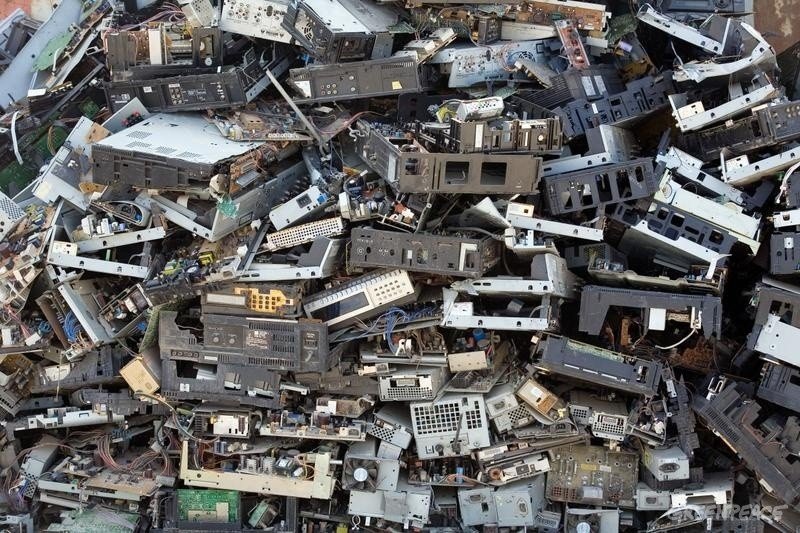
What is e-waste?
Electronic waste (or e-waste) includes computers, entertainment electronics, mobile phones and other items that have reached the end of their useful life.
E-waste in BC
BCs Return-It Electronics programme is a province-wide, industry-led E.P.R. recycling programme for end-of-life electronics. It is available to all consumers and businesses in British Columbia. The programme was created in response to an amendment to the provincial Recycling Regulation in February 2006 which called for the electronics industry to take responsibility for the lifecycle management of their products.
In August 2007 the first phase of the programme was launched and residents of British Columbia could drop off TVs and computers at designated collection sites without charge, and be assured that the materials would be recycled responsibly through reputable Canadian industries. Phase-II of the electronics programme was launched in July 2010, expanding the list of acceptable electronics to include stereos, VCRs, cameras, telephones and other personal electronics. A full list of accepted materials can be found here.
The first phase successfully diverted more than 4,200 metric tons of electronic waste from landfills in its first two years, and is currently averaging 1200+ metric tons of diversion per month.
Phase-III, beginning October 1, 2011, will include small appliances, smoke detectors and carbon monoxide detectors. The fourth and final phase, scheduled for July 2012 saw the programme expanded to include large appliances, tools, electronic toys and sporting equipment, medical devices, automatic dispensers and industrial and institutional lighting.
WHO HANDLES E-WASTE IN BC?
Electronic waste is regulated by the Recycling Regulation from the Ministry of Environment. Electronic and electrical waste is a broad category encompassing a variety of materials, from computers and TVs to fluorescent lighting, thermostats and smoke detectors. As a result, there are a number of groups involved in making sure all of these materials are safely recycled.
E-Waste Recycling: Whats Really Going On?
Electronic equipment contains lead, mercury, cadmium fire-retardant chemicals and arsenic. These materials are a hazard to human health and to the environment. Diverting e-waste from landfills and ensuring they are properly recycled is essential to protecting our environment. Despite the importance of e-waste recycling, it has been a controversial topic in British Columbia since 2005, when the RCMP seized over 500,000 kg of e-waste being illegally shipped to developing countries from the Port of Vancouver. The exporters were attempting to exploit low environmental and employment standards of developing countries to gain increased profit.
Beyond the ethical problems of this practice, exporting hazardous waste to non-OECD countries is prohibited in Canada by the Export and Import of Hazardous Waste and Hazardous Recyclable Material Regulations (originally The Export and Import of Hazardous Waste Regulations). These Regulations were introduced in response to the United Nations Basel Convention adopted in 1989 and amended in 1994.
Despite Canadas regulations, exportation continued illegally, particularly in port cities like Vancouver. In an attempt to curb this illegal activity, the British Columbia Ministry of Environment amended the Recycling Regulation in 2006 to include electronic and electrical waste. Two stewardship agencies, Electronic Products Recycling Association (EPRA) and Western Canada Computer Industry Association (WCCIA), were approved to develop and administer recycling programmes. The programmes began in 2007 and included home televisions, computers, and computer peripherals.
The programmes were successful, with high diversion rates and enthusiastic participation from residents. However, in 2008, CBCs The National aired a segment titled “E-Waste Dumping Ground,” revealing that a recycling company registered with WCCIA was illegally exporting electronic waste. The WCCIA stewardship plan was eventually rescinded and is no longer in effect. Regardless, distrust persisted amongst the general public.
Now, in 2011, EPRA handles all personal and household electronic devices, including televisions, computers, stereos, DVD players, VCRs, cameras, landline telephones and answering machines, mp3 players, headsets and docking speakers. EPRA currently uses five North American processors, four of which are within B.C. All recyclers processing programme materials are audited according to Electronic Product Stewardship Canadas (EPSC) Environmental Recycling Standard (ERS). EPRA must participate in an audit annually; the final report must be submitted to the Ministry of Environment and published publically online. Although e-waste recycling had a shaky start, B.C. residents can have confidence in the EPRA Electronics Return-It programme.